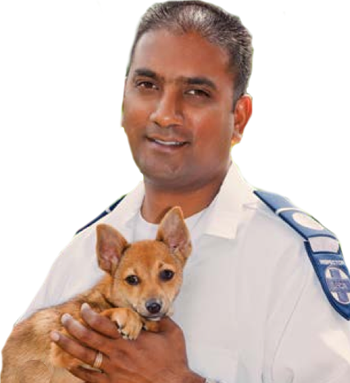Response to the post currently doing the rounds about a GSD dog
Posted on 2021-12-15 10:50:22

We are aware of the social media post currently circulating about a GSD dog who was handed over to us during Diwali. A reminder regarding our policies and procedures with stray animals:
All stray animals are documented, after which they will go through to our clinic to be checked for a microchip and given a health check. If the animal is microchipped, their owner will immediately be notified that their pet is with us. We do reference check against the lost reports received from pet owners to check if there are any possible matches.
If there is no tag, no matching lost report, no microchip, and we have no way of tracing the owner, the animal is kept for 7 days in our care. If the animal is severely injured or unhealthy we will euthanase in the best interest of the animal in our care.
Once the 7 day pound period has passed, the animal becomes the property of the SPCA and, if healthy and sociable, will be offered for adoption to a new home. Unfortunately the GSD in question was older at 9 years and had a cough; we treated the cough from 6th November but he was not recuperating nor coping well in the kennel environment, and was therefore humanely put to sleep on 1 December.
When an animal is handed to the SPCA we clearly state verbally and on the document – which the member of the public signs – that the animal becomes the property of the SPCA, that we will do what is deemed fit, and NO further claim or query can be made against him/her. This is a legally binding document.
To explain our overall position on humane euthanasia further: the intake at our SPCA from April-November is 4295 dogs and 4428 cats, with 319 dogs adopted and 69 cats adopted. This is the sad reality.
We are not creating the unwanted dogs and cats; society is. We do the best we can under the circumstances. The current overpopulation of domestic animals caused by indiscriminate breeding, the dumping of unwanted animals, irresponsible guardianship of companion animals, and lack of sterilisation dictates that the SPCA movement in South Africa accepts that euthanasia is necessary. The SPCA believes that unwanted companion animals deserve a dignified, painless death rather than risk suffering resulting from animal cruelty such as malnutrition, disease, trauma, and physical abuse – all commonly associated with unwanted or neglected animals.
The reality is that there are more unwanted animals in South Africa, than there are good, quality homes, which places SPCAs in an incredibly difficult position. There are other animal welfare organisations who utilise this service at the SPCA, but prefer not to publicise their policy in order to avoid vociferous criticism ... which the SPCA deals with every day. Arguments are frequently put forward that if SPCAs permitted “long-distance” adoptions, or kept animals for longer periods, euthanasia could be avoided or drastically reduced. Neither of these takes into account the number of animals involved nor the reason/s for euthanasia.
A “healthy” animal may be euthanased for behavioural reasons such as incompatibility with other animals or documented unprovoked attacks on people. Disease is also a major factor. SPCAs may not turn away any animal (the SPCA movement is governed by the Animals Protection Act 169 of 1993). If there is a breakout of an infectious disease, it is tragic yet inevitable that to prevent further spread, there have to be measures taken which may include euthanasia.
Finding someone to take an animal to avoid euthanasing it is irresponsible. Offering to take an animal, having been led to believe that euthanasia might be imminent, is emotional blackmail and impulse adopting puts the long-term welfare of the animal at risk. Furthermore, it is inhumane to confine animals for long periods. The result of long term confinement is stress and this may lead to self-injury/harm, or behavioural problems which may never be overcome, rendering the animal even less likely to be adopted or to settle in a home. Not to mention, the psychological and emotional health of an animal is as important as their physical health.
In conclusion, the SPCA is opposed to the euthanasia of fit and healthy animals, but accepts the reality that euthanasia is necessary. The SPCA treats each case with the greatest care and compassion, realising that there are fates far worse than death.
We consider the matter regarding the GSD now closed, and will not be engaging in any further communication regarding this dog. Any malicious slander on our social media pages will result in being banned from our page. Thank you to our supporters for your understanding and commitment in helping us to make the world a better place for animals.







